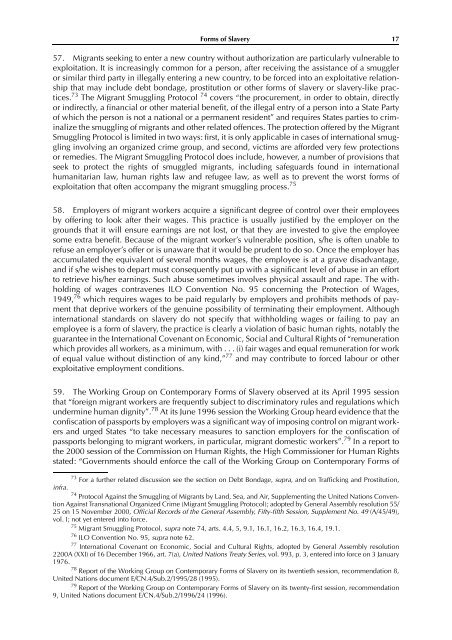Slavery in The 21st Century
Slavery in The 21st Century
Slavery in The 21st Century
Create successful ePaper yourself
Turn your PDF publications into a flip-book with our unique Google optimized e-Paper software.
Forms of <strong>Slavery</strong> 17<br />
57. Migrants seek<strong>in</strong>g to enter a new country without authorization are particularly vulnerable to<br />
exploitation. It is <strong>in</strong>creas<strong>in</strong>gly common for a person, after receiv<strong>in</strong>g the assistance of a smuggler<br />
or similar third party <strong>in</strong> illegally enter<strong>in</strong>g a new country, to be forced <strong>in</strong>to an exploitative relationship<br />
that may <strong>in</strong>clude debt bondage, prostitution or other forms of slavery or slavery-like practices.<br />
73 <strong>The</strong> Migrant Smuggl<strong>in</strong>g Protocol 74 covers “the procurement, <strong>in</strong> order to obta<strong>in</strong>, directly<br />
or <strong>in</strong>directly, a f<strong>in</strong>ancial or other material benefit, of the illegal entry of a person <strong>in</strong>to a State Party<br />
of which the person is not a national or a permanent resident” and requires States parties to crim<strong>in</strong>alize<br />
the smuggl<strong>in</strong>g of migrants and other related offences. <strong>The</strong> protection offered by the Migrant<br />
Smuggl<strong>in</strong>g Protocol is limited <strong>in</strong> two ways: first, it is only applicable <strong>in</strong> cases of <strong>in</strong>ternational smuggl<strong>in</strong>g<br />
<strong>in</strong>volv<strong>in</strong>g an organized crime group, and second, victims are afforded very few protections<br />
or remedies. <strong>The</strong> Migrant Smuggl<strong>in</strong>g Protocol does <strong>in</strong>clude, however, a number of provisions that<br />
seek to protect the rights of smuggled migrants, <strong>in</strong>clud<strong>in</strong>g safeguards found <strong>in</strong> <strong>in</strong>ternational<br />
humanitarian law, human rights law and refugee law, as well as to prevent the worst forms of<br />
exploitation that often accompany the migrant smuggl<strong>in</strong>g process. 75<br />
58. Employers of migrant workers acquire a significant degree of control over their employees<br />
by offer<strong>in</strong>g to look after their wages. This practice is usually justified by the employer on the<br />
grounds that it will ensure earn<strong>in</strong>gs are not lost, or that they are <strong>in</strong>vested to give the employee<br />
some extra benefit. Because of the migrant worker’s vulnerable position, s/he is often unable to<br />
refuse an employer’s offer or is unaware that it would be prudent to do so. Once the employer has<br />
accumulated the equivalent of several months wages, the employee is at a grave disadvantage,<br />
and if s/he wishes to depart must consequently put up with a significant level of abuse <strong>in</strong> an effort<br />
to retrieve his/her earn<strong>in</strong>gs. Such abuse sometimes <strong>in</strong>volves physical assault and rape. <strong>The</strong> withhold<strong>in</strong>g<br />
of wages contravenes ILO Convention No. 95 concern<strong>in</strong>g the Protection of Wages,<br />
1949, 76 which requires wages to be paid regularly by employers and prohibits methods of payment<br />
that deprive workers of the genu<strong>in</strong>e possibility of term<strong>in</strong>at<strong>in</strong>g their employment. Although<br />
<strong>in</strong>ternational standards on slavery do not specify that withhold<strong>in</strong>g wages or fail<strong>in</strong>g to pay an<br />
employee is a form of slavery, the practice is clearly a violation of basic human rights, notably the<br />
guarantee <strong>in</strong> the International Covenant on Economic, Social and Cultural Rights of “remuneration<br />
which provides all workers, as a m<strong>in</strong>imum, with . . . (i) fair wages and equal remuneration for work<br />
of equal value without dist<strong>in</strong>ction of any k<strong>in</strong>d,” 77 and may contribute to forced labour or other<br />
exploitative employment conditions.<br />
59. <strong>The</strong> Work<strong>in</strong>g Group on Contemporary Forms of <strong>Slavery</strong> observed at its April 1995 session<br />
that “foreign migrant workers are frequently subject to discrim<strong>in</strong>atory rules and regulations which<br />
underm<strong>in</strong>e human dignity”. 78 At its June 1996 session the Work<strong>in</strong>g Group heard evidence that the<br />
confiscation of passports by employers was a significant way of impos<strong>in</strong>g control on migrant workers<br />
and urged States “to take necessary measures to sanction employers for the confiscation of<br />
passports belong<strong>in</strong>g to migrant workers, <strong>in</strong> particular, migrant domestic workers”. 79 In a report to<br />
the 2000 session of the Commission on Human Rights, the High Commissioner for Human Rights<br />
stated: “Governments should enforce the call of the Work<strong>in</strong>g Group on Contemporary Forms of<br />
73 For a further related discussion see the section on Debt Bondage, supra, and on Traffick<strong>in</strong>g and Prostitution,<br />
<strong>in</strong>fra.<br />
74 Protocol Aga<strong>in</strong>st the Smuggl<strong>in</strong>g of Migrants by Land, Sea, and Air, Supplement<strong>in</strong>g the United Nations Convention<br />
Aga<strong>in</strong>st Transnational Organized Crime (Migrant Smuggl<strong>in</strong>g Protocol); adopted by General Assembly resolution 55/<br />
25 on 15 November 2000, Official Records of the General Assembly, Fifty-fifth Session, Supplement No. 49 (A/45/49),<br />
vol. I; not yet entered <strong>in</strong>to force.<br />
75 Migrant Smuggl<strong>in</strong>g Protocol, supra note 74, arts. 4.4, 5, 9.1, 16.1, 16.2, 16.3, 16.4, 19.1.<br />
76 ILO Convention No. 95, supra note 62.<br />
77 International Covenant on Economic, Social and Cultural Rights, adopted by General Assembly resolution<br />
2200A (XXI) of 16 December 1966, art. 7(a), United Nations Treaty Series, vol. 993, p. 3, entered <strong>in</strong>to force on 3 January<br />
1976.<br />
78 Report of the Work<strong>in</strong>g Group on Contemporary Forms of <strong>Slavery</strong> on its twentieth session, recommendation 8,<br />
United Nations document E/CN.4/Sub.2/1995/28 (1995).<br />
79 Report of the Work<strong>in</strong>g Group on Contemporary Forms of <strong>Slavery</strong> on its twenty-first session, recommendation<br />
9, United Nations document E/CN.4/Sub.2/1996/24 (1996).

















